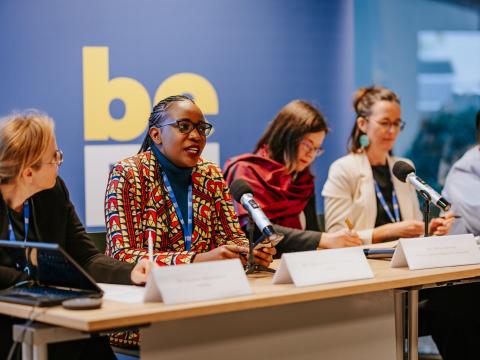Girls' Education Takes Centre Stage at Belgian Presidency of the Council of the EU Event

Poverty, discrimination and exploitation keep millions of girls out of school each year. What's more, half of all girls in low-income countries do not complete primary school. This poses a significant threat to girls' opportunities to thrive and take control of their future.
At the “Improving Educational Attainment and Learning for Girls” event, held by the Belgian Presidency of the Council of the EU, World Vision supported young advocates from the European Week of Action for Girls (EWAG) to connect with policymakers and share their experiences on how the EU can better support girls' access to education.
"I have witnessed first-hand the impact of limited education on girls. They crave knowledge & dream of controlling their future"
- Natanim, an EWAG Young Advocate from Ethiopia.
Meanwhile, young advocate Shamsa warned of the challenges many girls face in Tanzania, including how inadequate Sexual Reproductive Health and Rights (SRHR) education can lead to teenage pregnancy and insufficient use of vital health services. Together, both Shamsa and Natanim drew on their own experiences to call for continued investment in education, SRHR and job creation to help girls realise their full potential.
The event also saw interventions from speakers from the European Union, UNESCO, National Governments, and Civil Society Organisations.
What did we learn?
-
Let’s listen to girls. Young advocates Shamsa and Natanim both drew on their own experiences to call for continued investment in education, SRHR and job creation to help girls realise their full potential. Girls must be at the centre of these discussions.
-
We need to invest in the power of teachers. Citing their recent ‘African Teachers Report’, Quentin Wodon (Director of UNESCO IICBA) highlighted how lack of learning is a key reason for children dropping out of primary school. Investing in quality teachers is crucial to address this issue and improve the foundational learning that keeps children in school. In fact, if all girls could complete secondary education, we could virtually end child marriage.
-
Keeping girls in school makes economic sense. Ms. Angela Nakafeero (Commissioner for Gender and Women Affairs at the Ministry of Gender, Labour and Social Development of Uganda) noted how Uganda loses 645million Ugandan shillings each year from lost potential due to child marriage and teenage pregnancy.
-
The EU Global Gateway is an important mechanism to invest in girls' education. Caroline Gennez (Belgian Minister for Development Cooperation and Major Cities) shared that the ‘softer’ part of EU Global Gateway, components that involve investing in education, are essential in contributing to fighting child marriage and providing equal opportunities for all girls to thrive.
-
Towards a whole systems approach to gender transformative education. According to Eline Versulys (UNEIE), education alone is not enough. Schools must also be safe spaces where harmful gender norms and stereotypes can be addressed and deconstructed. For this, we need to bring boys into the conversation.
-
Girls need role models. Catherine Asego (FAWE) highlighted the importance of female role models such as teachers and leaders, especially in the field of STEM, to inspire young girls and demonstrate pathways to success.
-
Value lies in international partnerships and multi-sectoral approaches. Evelien Masschelein (ENABEL) shared the value of local expertise. Access to education is a global issue requiring global solutions that build on the expertise of EU partners.
This event was an important moment to address the challenges and harness the opportunities in girls' education. As World Vision, we work with EU institutions to ensure that development and humanitarian policies reflect the priorities of children around the world, especially the most vulnerable.
With the launch of our recent ENOUGH campaign – an ambitious plan to take action against child hunger – we’re working to keep children in school through the provision of nutritious school meals. By providing children with access to education and nutritious meals, school meal programs can help empower girls to become agents of change in their communities. Our work with the School Meals Coalition means that we see the positive impacts of school feeding every day.
Through research, dialogue, and international collaboration, we can drive meaningful change and ensure that education truly serves as an enabler for girls and sustainable development globally.
Thank you to the Belgian Presidency of the Council of the EU for hosting. Let’s continue the conversation on girls' rights throughout your presidency!